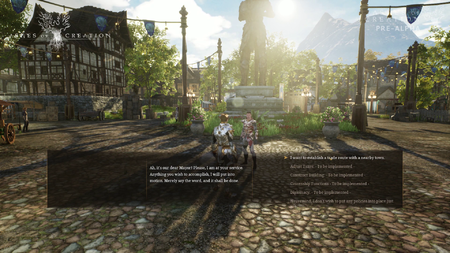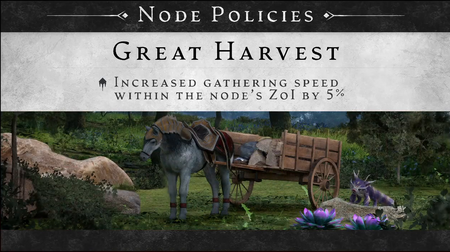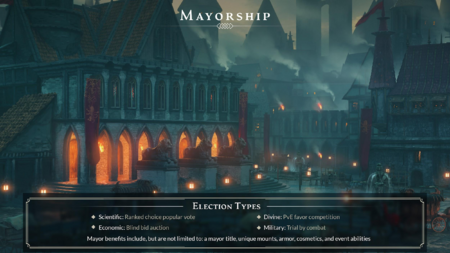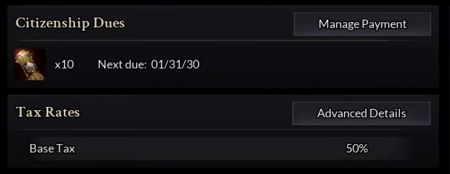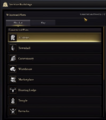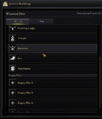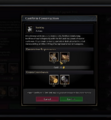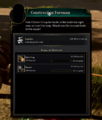Mayors
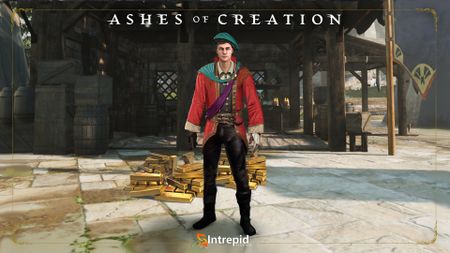
Mayors have a unique ability to elicit change within the node proper, either through the destruction of certain buildings that have been constructed previously, because there's a limited number of slots that buildings can be constructed within, or the kickoff of additional projects, or the certain types of policies that can be enacted, like... the changing of a tax rate. They all have a unified source of energy requirement and the energy requirement is a mandate.[2] – Steven Sharif
Mayors are chosen through different election methods according to the node's type.[3][4]
- Only node citizens may be elected mayor.[5]
- Previous mayors won't have any special system driven bonuses to help them get reelected.[7]
- Kings and Queens can also become a mayors.[5]
- Mayoral leadership powers are granted via the use of mandates.[2][8]
- Players will be able to view a historical listing of mayors of a node.[9]
Mayoral leadership powers

The government has a lot of say in the direction of the node's development. Directing assets, building projects, tax allocation, defensive ability etc. Players have the ability to not only create these cities, but they have the right of self-governance.[11]
Mayoral leadership powers are granted to mayors via the use of mandates.[2][8]
- Initiate buy orders using gold from the node treasury.[12][13][14][15]
- Initiate mayoral commissions to aid node development.[12][16][14][2][17][11]
- Adjust node taxes.[12][2][18] This includes setting tax rates that apply to tavern games.[19][20]
- Tax money may only be used to fund node development.[21]
- Initiate service building construction and expansions.[12][2]
- Improving node defensive structures, such as stronger walls and gates, traps, and siege equipment.[17][22][23][24][11]
- Hiring mercenary NPCs to defend the node during sieges.[25][11]
- Set a message-of-the-day for the node.[26]
- Proposing node policies that are voted on by citizens.[27][28][17]
- Mayors won't have formal systems to carry out surveys/polls of node citizens, but they will be able to utilize node citizen chat or message-of-the-day services.[26]
- Mayors may have special color names in node chat channels.[26]
- Entering into trade agreements with other nodes.[12][27][29]
- Mayors cannot denote players as enemies of the state.[31] Previously this was a potential option.[29][32]
- Mayors are notified when their node is named on a siege declaration scroll.[33]
- Mayors and lords of castles have spells they can use on the battlefield with high effect and long cooldowns for their teams.[34]
- Mayors gain new powers and responsibilities as their node advances.[4]
- Some leadership powers are specific to node type, biome, or dominant race, others are universal.[37]
- There definitely are differences... Some of the things that mayors can do are more universal, but then some systems have very specific if your node has a certain dominant race, or your node is a certain type, or it's in a certain biome. So there's even differences between where it is too.[37] – Chris Justo
- If a mayor does not make certain decisions within a set period of time then the system will make a decision for them.[39][40]
- Q: The idea behind all these nodes are awesome, but I wonder how it will actually play out in the live version. The problem is having player run or the problem with having player run towns is that people come and go in video games. So, will towns die out etc?
- A: We incorporate as part of those designs certain fail-safes, certain protections, certain automated progression that takes over when some of those decisions are lacking or are not made; and those decisions can be defaulted. Now, of course, that would have a deleterious effect on the direction that a particular node might want to go, because they're going to be doing default behaviors, or default actions, as opposed to something that might be in line with the strategic objective of that particular node, or the specialization that the node has previously been attempting to do. But that is why we have a regularly recurring election period where players can take the reins of power and can elect someone else to come in and participate and and re-right the ship, so to speak. So it is absolutely a component of having player-driven mechanics that there is an opportunity for things to be less than ideal, or less than strategic when certain bad-faith actors or people leave, but there are safeguards in place.[39] – Steven Sharif
Buy orders

Buy orders are instrumental in the activities that a node participates in.[46] – Steven Sharif

We're gonna build a Forge today, or a Smithy- we renamed it: it's not a forge anymore- and we need bins of stone for it.[47] – Chris Justo
Buy orders are the primary way for a node to generate node commodities that can be spent on construction, upgrades, and maintenance of node service buildings.[12][13]
- Mayors initiate buy orders using gold from the node treasury.[12][13][14] The mayor can adjust the parameters of buy orders:
- How many commodities are being requested.[12][13]
- How long the buy order is active.[12][13]
- The raw materials or crafting materials required to complete the buy order.[48][12][13] Final goods are not used to complete buy orders.[48]
- How much players are rewarded.[12][13]
- When selecting specific types of buy orders that require certain material components in order to fulfill, you will have a wide array of material choices to make: either those that are relevant locale to your node placement or those that are across the world; and there is a variable in payment that the mayor has access to in setting and how they'll be rewarding players. So you need to make sure that you're incentivizing players who are making those large transits across the world to actually take that risk and bring those materials to you.[49] – Steven Sharif
- Players are rewarded with bound node currency and node reputation for fulfilling buy orders.[46][12][13]
- Once a material gets sunk into the buy order, the player receives the benefit of the node currency, which right now is a bound currency that's used to purchase a number of different types of vendorable items that exist within nodes.[46] – Steven Sharif
- If a mayor does not create buy orders, they will auto-populate after a set period of time based on node activities.[50]
- If the mayor is not making these decisions, buy orders will populate based off of activities that the node have available to them after a set period of time. So that the bad faith mayor is not depleting the node potentially of its resources that players can still interact with.[50] – Steven Sharif
- Node citizens participating in buy orders will generate mandates for their node.[51]
- Players will be able to view buy orders that are listed at nodes around the world.[52]
- Those of you who are traders and are interested in actually capitalizing on the supply and demand of nodes and their competing interests and what they're trying to accomplish will have an opportunity to move those goods around the world: Take that risk potentially, but receive a high reward as a result.[52] – Steven Sharif
- Buy orders are distinct from mayoral commissions.[53]
- A buy order is strictly material-based and you don't accept a buy order and then go do it. It is something that you can just check your node UI or you can check the nodes around you to see what they have active and you can just go do it and come back; and participate or fulfill these buy orders. Whereas, a commission is- a mayoral commission is more like a quest. It's something you pick up and then it tracks your activity while you have it.[53] – Chris Justo
Mayoral caravans
Mayoral caravans (also referred to as Trade caravans) are launched by Mayors to obtain needed resources from other nodes.[55][56][54]
- Nodes answering these resource requests must have a trade agreement or alliance with the requesting node.[56][54][29]
- Once the requesting mayor accepts a fill order from another node, a system driven caravan is spawned to transit the goods.[56][54]
- Players can participate in helping to defend the caravan if they wish.[56]
- Trade caravans can initiate world events.[55]
- Mayors who need certain resources that either they don't have enough of, or that they're prospectively investing in: they will initiate a mayor request, and any node that sees that request on the mayoral caravan drop-down menu will have an opportunity to attempt to fulfill the trade request. In order to fulfill a trade request, a node must have a certain level of relationship with that requesting node. At a minimum it has to be a trade agreement relationship; and then there's a limited number of those trade relationships that you can have; and that scales up to eventually alliance perspective. And then, once the node requesting mayor accepts a potential fill order, then a system spawned caravan is generated and the transit is completed. Players can participate in helping to defend that or not.[56] – Steven Sharif
Mayoral commissions

Mayoral commissions serve as a strategic decision base for the mayor. What issues am I facing? What issues do I believe I will face? How is this aligning with my strategy? And then how will my citizens help me help participate in accomplishing these goals so that I'm best set strategically for what I intend to do with those commissions?[57] – Steven Sharif
Mayoral commissions are simple types of quests with singular objectives that are able to be initiated by mayors.[12][16][14]
- Mayoral commissions cost gold from the treasury for the mayor to initiate.[12][16]
- There are a limited number of commission slots available to be set by the mayor at any one time.[58][16]
- Access to commissions is based on node type, location, building choices, and predominant node race.[12][16]
- There will be a cap to the number of commissions that can be accepted by a single player.[58]
- Completing mayoral commissions will reward the node with node commodities, node-to-node reputation, mandates, and temporary buffs to buildings or zones.[12][16]
- Players will receive experience, node reputation, node currency, and other miscellaneous rewards.[12][16][14]
- Mayoral commissions can be conducted by both citizens and non-citizens, but only citizen contribution will generate mandates for the node.[58][16]
- Mayoral commissions are similar to commissions, which are system-generated quests that enable characters and nodes to gain XP.[59][58]
- Q: Is participation always going to be greater for larger nodes by default, or can a small node with close to 100 participation still greatly benefit from them?
- A: That's gonna come down to what commissions the mayor is initiating. Level three nodes aren't going to be initiating mayoral commissions that require thousands of players to participate, because they don't have access to those; where Metropolises that have a huge citizenship base will get access to those kinds of commissions. So the rewards will be proportionate to the node level and the expected amount of citizens.[60] – Chris Justo
Node policies
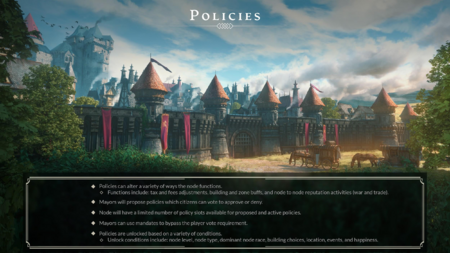
Nodes have a number of slots that they get to employ as Government policies that are enacted and chosen by the mayor and voted on by the people; and certain policies get unlocked by certain happiness states of the factions within the node; and those happiness states are predicated across different achievements that can happen in the world story arcs that get finished; bosses that get killed around you; new buildings that get constructed: Lots of different things can contribute to that happiness value: Number of citizens; number of citizens you've had leave; number of houses that might have been foreclosed upon. There's lots of different things that influence it, but when the happiness is met at a certain point- and even without that happiness you can still have policies that you get to enact regardless. You may choose policies that do certain things for the node; and this is a big strategic decision that the node has to almost agree on because it's voted on by the citizens within a short time period, but elected by the outstanding mayor; and when you deploy a policy it confers benefits to the citizens, or to the area, or to specific buildings, or to the mayor.[28] – Steven Sharif
Node policies affect a variety of node functions, such as taxes and fees, building and zone buffs, and node-to-node reputation activities, such as trade agreements, and node wars.[12][27]
- Mayors propose node policies that are voted on by citizens within a 24-hour or shorter time period.[12][27][28][17]
- Policies are voted in if the majority of voters approve of them.[61]
- Mayors can utilize their available mandates to bypass policy votes.[12][27][2]
- Mayors may also be able to take emergency actions depending on certain predicates that get met. This might allow them to reduce the voting threshold or voting time for policies.[61][28]
- There are a limited number of policy slots available to be proposed.[12][27] Some policies occupy multiple slots.[28]
- Node policies that are deployed will provide benefits to various aspects of the node, its citizens, its ZOI, its vassals (in some cases), specific buildings, and to its mayor.[61][28]
- Certain policies may affect the visual appearance of the node.[62]
- Some of the benefits you can receive by being a vassal of a certain parent is access to a policy that your node not might not normally have access to; and in fact you can also unlock an additional policy slot based on certain conditions that the parent or Sovereign node may have access to in their reliquary, or in their achievement systems, or in policies that they've elected. Some policies occupy multiple slots and it's almost like a card structure. You have each of these policies that live on a card and you get to select that card- throw it into the slot it goes out to the citizens to vote on within the 24-hour or sometimes shorter period. The mayor has emergency actions they can take right depending on certain predicates that get met and if an emergency action occurs they may be able to spend their influence as mayor within their term to set up a policy for a vote within an hour's period of time; and citizens in that way they can sneak it through a bit.[28] – Steven Sharif
Policies are unlocked by various conditions within a node.[12][27][28][17]
- Node level.[12][27]
- Node type.[12][27]
- Dominant node race.[12][27][28]
- Building choices.[12][27][28]
- Location of the node.[12][27]
- Events, such as node wars and node sieges.[61][12][27]
- Node happiness.[12][27][63][64]
- Achievements based on the completion of story arcs.[28]
- World bosses that are defeated.[28]
- Node citizens gained (or lost).[28]
- Node housing foreclosed upon.[28]
- There's a lot of different things that policies can influence; and policies exist within certain denominations. You have some policies that might be reflective of the culture that the node is representing; and you get access to those cultural policies. You have some policies that might become available because you've constructed a certain building type and now you've attracted a guild of NPCs that are weapons smiths. You might have some policies that are social organizations representative- you only get to build one social organization or Temple: which religion does the node follow. All of these are customization points that the city gets to choose and now you as a citizen get to identify the city that best aligns with your progression within the game and your game style and gameplay.[28] – Steven Sharif
Node elections
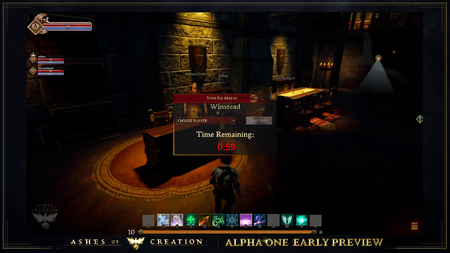
The village stage is a unique stage because that's when the government system comes online and all other stages past village there will have already been a cadence for the election system and it will follow that cadence, but after the initial village stage is completed there will be a one week period where players have an opportunity to establish citizenship at the village that also provides for the cooldown time that is- that would be present on players leaving another node to participate in in this particular node leveling up. But that after that one week period then there will be a one-week election process and then from that point moving forward will be the one month cadence that the node experiences elections on.[66] – Steven Sharif
Once a node has reached Village (stage 3) there will be a one week cooldown period before node elections begin.[66]
- This cooldown period allows players to establish citizenship at the village; which may require them to relinquish previous citizenship at another node.[66]
- Following the initial cooldown, there will be a one week election process, then from that point on, elections will follow a monthly cadence.[66]
- Node sieges may not be declared for 21 days following a node advancing to any stage.[67]
Node elections occur on a monthly basis.[66][69]
- Election notices will be mailed to the accounts of citizens.[70]
- Only citizens of a node may participate in its elections.[11]
- Only node citizens may be elected mayor.[5]
- A king or queen can also become a mayor.[5]
Node election types
Mayors are chosen through different methods according to the node's type.[3][4]
- Divine node mayors are elected based on the citizen who earns the most PvE favor with the node.[12][71][72][3]
- Most of the devotion-oriented tasks are going to be on an individual basis and won't utilize outside support.[73]
- Economic node mayors are elected via a blind-bid auction where the citizen bidding the most money wins.[12][71][72][3] This is a gold sink.[74]
- Military node mayors are elected based on trial by combat. During the election week the node will enter an open-PvP battleground state for hour-long periods where candidates (and their citizen supporters) compete to gain points by securing objectives. The highest point winner at the end of the week will win.[12][71]
- Academic node mayors are elected via ranked choice popular vote.[12][71]
- This was previously a single popular vote system.[72][3] Records of who voted for who are not published.[70]
Node taxes
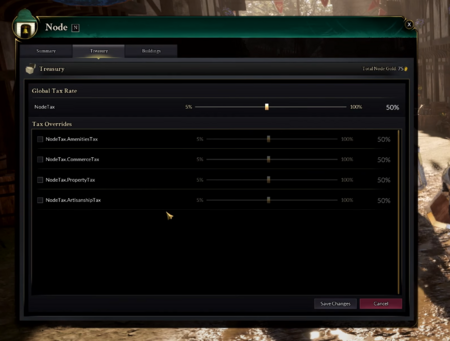
As the node levels up, you're gonna get access to deeper controls on the taxes, so that you as a Mayor can incentivize players to come to your node to do certain things. If you're a node that loves smithing, you're probably going to want to lower your taxes on artisanship to incentivize players to be here. But then you might want to drive up taxes on other avenues that players aren't necessarily coming to your node for, but are using out of convenience.[80] – Chris Justo
Mayors are able to set a generalized node tax rate as well as overrides for different activities within their node. Mayors gain additional taxation controls as their node advances.[80][18]
- Amenities tax override.[80]
- Artisanship tax override.[80]
- Commerce tax override.[80]
- This may include taxes that apply to tavern games.[19][20]
- Property tax override.[80]
- Freehold property taxes scale according to the number of freehold building permits issued for that freehold.[81][82][21]
- Citizenship dues and property taxes scale based on the stage of the node when a player became a citizen.[12][83][84][85][86]
- The goal is to exert financial pressure on node populations by making taxes increasingly expensive as nodes advance, rather than putting in place hard population caps.[84][85]
- Node tax rates will be visible on the world map by hovering over a node location.[87]
- Tax revenue only goes toward funding node development. This cannot be withdrawn by the mayor or any other player.[88][21]
Regent nodes take a cut of taxes from various activities that occur within their vassal node structure.[88][89]
- This tax doesn't necessarily impact the individual citizen, because citizen's tax levels are determined by their node, but the node's finances are affected by the taxation levied by its parent nodes.[89]
When a node reaches stage 3 (Village) and a player run government has formed, all player housing will pay taxes.[90]
- A player's tax charge will be determined by the number of structures built on their plot.[82][21]
- Freehold taxes are calculated based on the number of permits issued for buildings on a freehold.[91][92][81][82][21]
- Buildings that require permits will have additional upkeep costs.[91]
- Maintaining businesses requires licensing and payments to the node your Freehold is associated with. This permitting system allows for a certain number of buildings to be constructed on a Freehold. Permits can be obtained from the same node the Freehold was certified from, and buildings that require permits will have an additional upkeep cost.[91]
- Housing foreclosures result from failing to pay property taxes or other fees.[91]
City hall
Town hall (also called City hall) is a default service building that comes pre-built with nodes.[94][12][45][29]
- Players can interact with the node board to get a list of its citizens.[70] Clicking on a citizen will reveal information about their guild, society, religion, and property ownership.[70]
- Mayors and node governments use city hall to visualize and control activities within their node. These capabilities will also be available via mobile/web interface.[8]
- Status of the node's economy.[8]
- Status of upcoming elections.[8]
- Status of trade agreements.[8]
- Status of caravans.[8]
Node politics
There won't be a civil war mechanic within nodes but there will be scope for internal political conflicts; such as undermining the current leadership and disrupting trade.[95]
- The only way to remove an elected mayor prior to the end of their term is by destroying the node.[96]
We want consequences to matter and if that person got elected then you need to work within the means of the mechanics to get them unelected.[96] – Steven Sharif
Visuals
2023-09-19 2023-09-13 2023-09-04
See also
References
- ↑
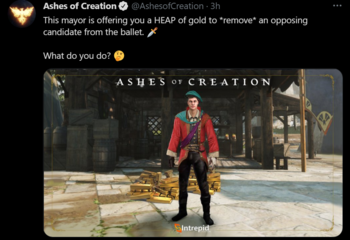
- ↑ 2.0 2.1 2.2 2.3 2.4 2.5 2.6 Livestream, August 31, 2023 (31:44).
- ↑ 3.0 3.1 3.2 3.3 3.4 Node series part II – the Metropolis.
- ↑ 4.0 4.1 4.2 Blog - Know Your Nodes - The Basics.
- ↑ 5.0 5.1 5.2 5.3 5.4 5.5

- ↑ 6.0 6.1 Interview, May 11, 2018 (50:05).
- ↑ Livestream, August 31, 2023 (37:35).
- ↑ 8.0 8.1 8.2 8.3 8.4 8.5 8.6 Livestream, November 17, 2017 (9:49).
- ↑ Livestream, September 29, 2023 (1:05:44).
- ↑ Livestream, December 12, 2018 (14:48).
- ↑ 11.0 11.1 11.2 11.3 11.4 11.5 11.6 11.7 MMOGames interview, January 2017
- ↑ 12.00 12.01 12.02 12.03 12.04 12.05 12.06 12.07 12.08 12.09 12.10 12.11 12.12 12.13 12.14 12.15 12.16 12.17 12.18 12.19 12.20 12.21 12.22 12.23 12.24 12.25 12.26 12.27 12.28 12.29 12.30 12.31 12.32 12.33 12.34 12.35 12.36 12.37 12.38 Blog: Development Update with Village Node.
- ↑ 13.0 13.1 13.2 13.3 13.4 13.5 13.6 13.7 Livestream, August 31, 2023 (59:43).
- ↑ 14.0 14.1 14.2 14.3 14.4 Interview, July 8, 2020 (1:04:05).
- ↑ 15.0 15.1 Livestream, June 30, 2017 (53:57).
- ↑ 16.0 16.1 16.2 16.3 16.4 16.5 16.6 16.7 16.8 Livestream, August 31, 2023 (39:17).
- ↑ 17.0 17.1 17.2 17.3 17.4 17.5 Livestream, April 29, 2022 (27:42).
- ↑ 18.0 18.1 Livestream, March 28, 2020 (1:03:38).
- ↑ 19.0 19.1

- ↑ 20.0 20.1

- ↑ 21.0 21.1 21.2 21.3 21.4

- ↑ Livestream, July 25, 2020 (1:22:40).
- ↑ Livestream, January 18, 2018 (37:05).
- ↑
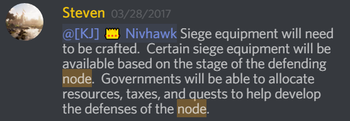
- ↑ Livestream, June 26, 2020 (59:11).
- ↑ 26.0 26.1 26.2 Livestream, August 31, 2023 (35:23).
- ↑ 27.00 27.01 27.02 27.03 27.04 27.05 27.06 27.07 27.08 27.09 27.10 27.11 27.12 27.13 27.14 Livestream, August 31, 2023 (44:21).
- ↑ 28.00 28.01 28.02 28.03 28.04 28.05 28.06 28.07 28.08 28.09 28.10 28.11 28.12 28.13 28.14 28.15 Livestream, August 26, 2022 (1:12:40).
- ↑ 29.0 29.1 29.2 29.3 29.4 29.5 City hall.
- ↑ Livestream, August 31, 2023 (29:04).
- ↑ Livestream, August 31, 2023 (30:41).
- ↑

- ↑ Livestream, December 23, 2021 (1:30:34).
- ↑ 34.0 34.1

- ↑ Livestream, July 25, 2020 (1:52:45).
- ↑ Livestream, August 31, 2023 (41:15).
- ↑ 37.0 37.1 Livestream, August 31, 2023 (28:30).
- ↑

- ↑ 39.0 39.1 Video, September 29, 2023 (1:52).
- ↑ Livestream, August 31, 2023 (29:33).
- ↑

- ↑ Livestream, May 19, 2017 (36:05).
- ↑ Livestream, May 19, 2017 (36:09).
- ↑
- ↑ 45.0 45.1 Livestream, August 31, 2023 (50:25).
- ↑ 46.0 46.1 46.2 Livestream, August 31, 2023 (1:01:10).
- ↑ 47.0 47.1 Video, August 31, 2023 (5:04).
- ↑ 48.0 48.1 Livestream, August 31, 2023 (1:06:01).
- ↑ Livestream, August 31, 2023 (1:02:35).
- ↑ 50.0 50.1 Livestream, August 31, 2023 (1:02:23).
- ↑ Livestream, August 31, 2023 (1:04:00).
- ↑ 52.0 52.1 Video, August 31, 2023 (12:55).
- ↑ 53.0 53.1 Livestream, August 31, 2023 (1:04:14).
- ↑ 54.0 54.1 54.2 54.3 Video, July 15, 2019 (2:12).
- ↑ 55.0 55.1 Video, September 29, 2023 (2:59).
- ↑ 56.0 56.1 56.2 56.3 56.4 Livestream, August 31, 2023 (2:10:23).
- ↑ Livestream, August 31, 2023 (43:07).
- ↑ 58.0 58.1 58.2 58.3 Livestream, August 31, 2023 (42:05).
- ↑

- ↑ Livestream, August 31, 2023 (43:27).
- ↑ 61.0 61.1 61.2 61.3 Livestream, August 31, 2023 (47:43).
- ↑ Livestream, August 31, 2023 (49:13).
- ↑ 63.0 63.1 Livestream, April 7, 2023 (1:19:41).
- ↑ 64.0 64.1 Livestream, August 26, 2022 (1:17:04).
- ↑ Livestream, March 28, 2020 (1:01:34).
- ↑ 66.0 66.1 66.2 66.3 66.4 Interview, March 27, 2020 (6:03).
- ↑
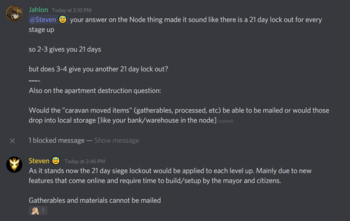
- ↑

- ↑

- ↑ 70.0 70.1 70.2 70.3 Livestream, October 30, 2020 (1:01:00).
- ↑ 71.0 71.1 71.2 71.3 71.4 Livestream, August 31, 2023 (24:54).
- ↑ 72.0 72.1 72.2 72.3 Interview, July 19, 2020 (26:54).
- ↑ Livestream, March 26, 2021 (1:18:26).
- ↑ Livestream, October 31, 2023 (1:35:22).
- ↑ Livestream, November 19, 2021 (51:56).
- ↑

- ↑ Interview, March 27, 2020 (09:05).
- ↑ Livestream, March 26, 2021 (1:17:20).
- ↑ Podcast, May 11, 2018 (52:20).
- ↑ 80.0 80.1 80.2 80.3 80.4 80.5 80.6 80.7 Video, August 31, 2023 (28:04).
- ↑ 81.0 81.1 Interview, July 9, 2023 (54:46).
- ↑ 82.0 82.1 82.2 Livestream, June 30, 2023 (1:45:22).
- ↑ Livestream, August 31, 2023 (15:51).
- ↑ 84.0 84.1 Interview, July 9, 2023 (38:14).
- ↑ 85.0 85.1 Interview, March 27, 2020 (0:30).
- ↑ Video, April 5, 2018 (41:48).
- ↑ Livestream, September 29, 2023 (1:11:22).
- ↑ 88.0 88.1 Livestream, August 26, 2022 (1:10:16).
- ↑ 89.0 89.1 Interview, May 11, 2018 (57:02).
- ↑

- ↑ 91.0 91.1 91.2 91.3 Blog: Exploring the Boundless Opportunities of Freeholds.
- ↑

- ↑ Video, August 31, 2023 (49:05).
- ↑ Video, August 31, 2023 (33:07).
- ↑ Livestream, May 24, 2017 (40:50).
- ↑ 96.0 96.1 Livestream, June 28, 2019 (1:26:14).
